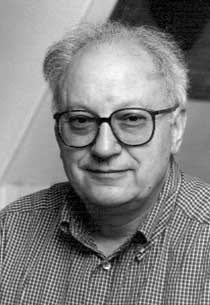 Étienne Balibar (born 23 April 1942 in Avallon, Yonne, Bourgogne) is a French Marxist philosopher. After the death of his teacher Louis Althusser, Balibar quickly became the leading exponent of French Marxist philosophy.
Étienne Balibar (born 23 April 1942 in Avallon, Yonne, Bourgogne) is a French Marxist philosopher. After the death of his teacher Louis Althusser, Balibar quickly became the leading exponent of French Marxist philosophy.Life and work
Balibar first rose to prominence as one of Althusser's pupils at the École Normale Supérieure. Balibar was a participant in Louis Althusser's seminar on Karl Marx's Das Kapital. This seminar resulted in the book entitled Reading Capital, coauthored by Althusser and his students, among whom Althusser considered Balibar's contribution the foremost. Balibar currently teaches philosophy and political theory at Paris X Nanterre and University of California, Irvine.In Masses, Classes and Ideas, Balibar argues that in Das Kapital, the theory of historical materialism comes into conflict with the critical theory that Marx begins to develop, particularly in his analysis of the category of labor, which in capitalism, becomes a form of property. This conflict involves two distinct uses of the term "labor": labor as the revolutionary class subject (i.e., the "proletariat") and labor as an objective condition for the reproduction of capitalism (the "working class"). In The German Ideology, Marx conflates these two meanings of labor, and treats labor as, in Balibar’s words, the “veritable site of truth as well as the place from which the world is changed..." In Capital, however, the disparity between these two senses of labor becomes apparent. One manifestation of this is the virtual disappearance in the text of the term "proletariat." As Balibar points out, the term appears only twice in the first edition of Capital, published in 1867: in the dedication to Wilhelm Wolff and in the two final sections on the "General Law of Capitalist Accumulation". For Balibar, what this problem implies is that "the emergence of a revolutionary form of subjectivity (or identity)... is never a specific property of nature, and therefore brings with it no guarantees, but obliges us to search for the conditions in a conjuncture that can precipitate class struggles into mass movements...". Moreover, "[t]here is no proof… that these forms are always and eternally the same (for example, the party-form, or the trade union."
Balibar's daughter is the actress Jeanne Balibar.
Works in French
- 1965: Lire le Capital. With Louis Althusser et al.
- 1974: Cinq Etudes du Matérialisme Historique.
- 1976: Sur La Dictature du Prolétariat.
- 1985: Spinoza et la politique.
- 1988: Race, Nation, Classe. With Immanuel Wallerstein.
- 1991: Écrits pour Althusser.
- 1997: La crainte des masses.
- 1998: Droit de cité. Culture et politique en démocratie.
- 1999: Sans-papiers: l’archaïsme fatal.
- 2001: Nous, citoyens d’Europe? Les frontières, l’État, le peuple.
- 2003: L'Europe, l'Amérique, la Guerre. Réflexions sur la médiation européenne.
- 2005: Europe, Constitution, Frontière.
Selected translations
- 1970: Reading Capital (London: NLB). With Louis Althusser. Trans. Ben Brewster.
- 1977: On the Dictatorship of the Proletariat (London: NLB). Trans. Grahame Lock.
- 1991: Race, Nation, Class: Ambiguous Identities (London & New York: Verso). With Immanuel Wallerstein. Trans. Chris Turner.
- 1994: Masses, Classes, Ideas: Studies on Politics and Philosophy Before and After Marx (New York & London: Routledge). Trans. James Swenson.
- 1995: The Philosophy of Marx (London & New York: Verso). Trans. Chris Turner.
- 1998: Spinoza and Politics (London & New York: Verso). Trans. Peter Snowdon.
- 2002: Politics and the Other Scene (London & New York: Verso). Trans. Christine Jones, James Swenson & Chris Turner.
- 2004: We, the People of Europe? Reflections on Transnational Citizenship (Princeton & Oxford: Princeton University Press). Trans. James Swenson.
Source: http://en.wikipedia.org/wiki/%C3%89tienne_Balibar